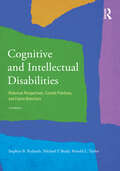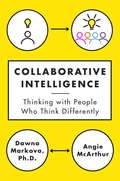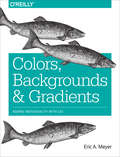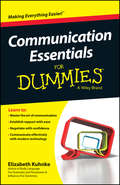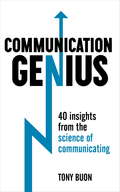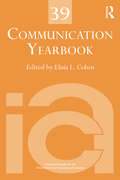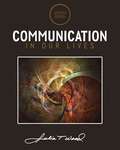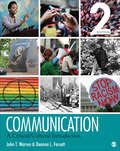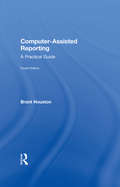- Table View
- List View
Cognitive Radio and Networking for Heterogeneous Wireless Networks: Recent Advances and Visions for the Future (Signals and Communication Technology)
by Maria-Gabriella Di Benedetto Faouzi Bader Andrea F. Cattoni Jocelyn Fiorina Luca De NardisThis book, written by leading experts from academia and industry, offers a condensed overview on hot topics among the Cognitive Radios and Networks scientific and industrial communities (including those considered within the framework of the European COST Action IC0902) and presents exciting visions for the future. Examples of the subjects considered include the design of new filter bank-based air interfaces for spectrum sharing, medium access control design protocols, the design of cloud-based radio access networks, an evolutionary vision for the development and deployment of cognitive TCP/IP, and regulations relevant to the development of a spectrum sharing market. The concluding chapter comprises a practical, hands-on tutorial for those interested in developing their own research test beds. By focusing on the most recent advances and future avenues, this book will assist researchers in understanding the current issues and solutions in Cognitive Radios and Networks designs.
Cognitive and Intellectual Disabilities: Historical Perspectives, Current Practices, and Future Directions
by Ronald L. Taylor Stephen B. Richards Michael P. BradyCognitive and Intellectual Disabilities: Historical Perspectives, Current Practices, and Future Directions provides thorough coverage of the causes and characteristics of cognitive and intellectual disabilities (formerly known as mental retardation) as well as detailed discussions of the validated instructional approaches in the field today. Features include: A companion website that offers students and instructors learning objectives, additional activities, discussion outlines, and practice tests for each chapter of the book. An up-to-date volume that reflects the terminology and criteria of the DSM-V and is aligned with the current CEC standards. Teaching Applications: presents the strongest coverage available in any introductory text on instructional issues and applications for teaching students with cognitive and intellectual disabilities. A unique chapter on "Future Issues" that explores the philosophical, social, legal, medical, educational, and personal issues that professionals and people with cognitive and intellectual disabilities face. This comprehensive and current introductory textbook is ideally suited for introductory or methods courses related to cognitive and intellectual disabilities.
Cold War Modernists: Art, Literature, and American Cultural Diplomacy
by Greg BarnhiselCold War Modernists documents how the CIA, the State Department, and private cultural diplomats transformed modernist art and literature into pro-Western propaganda during the first decade of the Cold War
Collaborative Intelligence: Thinking with People Who Think Differently
by Dawna Markova Angie McarthurA breakthrough book on the transformative power of collaborative thinking Collaborative intelligence, or CQ, is a measure of our ability to think with others on behalf of what matters to us all. It is emerging as a new professional currency at a time when the way we think, interact, and innovate is shifting. In the past, "market share" companies ruled by hierarchy and topdown leadership. Today, the new market leaders are "mind share" companies, where influence is more important than power, and success relies on collaboration and the ability to inspire. Collaborative Intelligence is the culmination of more than fifty years of original research that draws on Dawna Markova's background in cognitive neuroscience and her most recent work, with Angie McArthur, as a "Professional Thinking Partner" to some of the world's top CEOs and creative professionals. Markova and McArthur are experts at getting brilliant yet difficult people to think together. They have been brought in to troubleshoot for Fortune 500 leaders in crisis and managers struggling to inspire their teams.When asked about their biggest challenges at work, Markova and McArthur's clients all cite a common problem: other people. This response reflects the way we have been taught to focus on the gulfs between us rather than valuing our intellectual diversity--that is, the ways in which each of us is uniquely gifted, how we process information and frame questions, what kind of things deplete us, and what engages and inspires us. Through a series of practices and strategies, the authors teach us how to recognize our own mind patterns and map the talents of our teams, with the goal of embarking together on an aligned course of action and influence.In Markova and McArthur's experience, managers who appreciate intellectual diversity will lead their teams to innovation; employees who understand it will thrive because they are in touch with their strengths; and an entire team who understands it will come together to do their best work in a symphony of collaboration, their individual strengths working in harmony like an orchestra or a high-performing sports team.Praise for Collaborative Intelligence "Rooted in the latest neuroscience on the nature of collaboration, Collaborative Intelligence celebrates the power of working and thinking together at the highest levels of business and politics, and in the smallest aspects of our everyday lives. Dawna Markova and Angie McArthur show us that our ability to collaborate is not only a measure of intelligence, but essential to solving the world's problems and seeing the possibilities in ourselves and others."--Arianna Huffington "This inspiring book teaches you how to align your intention with the intention of others, and how, through shared strengths and talents, you have every right to expect greatness and set the highest goals and expectations."--Deepak Chopra "Everyone talks about collaboration today, but the rhetoric typically outweighs the reality. Collaborative Intelligence offers tangible tools for those serious about becoming 'system leaders' who can close the gap and make collaboration real."--Peter M. Senge, author of The Fifth Discipline"Building collaborative intelligence by putting the concepts in this book into action with my executive team was one of the most critical variables to our success."--Jeff Dunn, CEO, Bolthouse FarmsFrom the Hardcover edition.
Colors, Backgrounds, and Gradients: Adding Individuality with CSS
by Eric A. MeyerOne advantage of using CSS3 is that you can apply colors and backgrounds to any element in a web document, create your own gradients, and even apply multiple backgrounds to the same element. This practical guide shows you many ways to use colors, backgrounds, and gradients to achieve some pretty awesome effects.Short and sweet, this book is an excerpt from the upcoming fourth edition of CSS: The Definitive Guide. When you purchase either the print or the ebook edition of Colors, Backgrounds, and Gradients, you’ll receive a discount on the entire Definitive Guide once it’s released. Why wait? Learn how to bring life to your web pages now.Define foreground colors for a border or element with the color propertyCombine foreground and background colors to create interesting effectsPosition and repeat one or more images in an element’s backgroundFix an image to a screen’s viewing area, rather than to the element that contains itUse color stops to define vertical, horizontal, and diagonal linear gradientsCreate spotlight effects, circular shadows, and other effects with radial gradients
Come Autopubblicare un Romanzo con gli Amici
by Aj Tipton Benedetta AlciatoSei pronto a divertirti e guadagnare autopubblicando con gli amici? Scrivere può essere un lavoro difficile, solitario se fatto da soli. Ma non deve essere per forza così. Ti offriamo un metodo di autopubblicazione collaborativo e divertente. Se stai iniziando a conoscere il mondo dell’autopubblicazione, o hai già iniziato, questa è la guida per te! Come Autopubblicare Romanzi con gli Amici è un progetto indispensabile per trasformare le tue idee di storia in lavori pubblicati. Vogliamo salvarti dalla frustrazione e solitudine di provare a fare tutto da solo. AJ Tipton è un team di grande successo nell’autopubblicazione, ed abbiamo l’intenzione di rivelarti i nostri segreti, le lezioni guadagnate lavorando sodo, ed i trucchi che abbiamo imparato su questo eccitante mondo. Questo libro include: + Il modo migliore per scegliere il tuo coautore + Come scegliere genere e sottogenere + Un metodo a prova di errore per creare storie che vendono + Una guida interna per assumere freelance per l’editing, la creazione della copertina, le traduzioni, e molto altro + Trucchi di formattazione ed editing + Piattaforme di pubblicazione e domande da fare: Amazon, Kindle Unlimited, Nook, ecc. + I pro e i contro della traduzione del tuo libro + Come creare – ed usare – il tuo budget + Trucchi per un marketing di successo + Il potere dei social media + Come mantenere la tua collaborazione vantaggiosa, condividere il lavoro, e continuare a scrivere insieme E molto altro ancora! Se sei pronto ad essere creativo e a scrivere con gli amici, leggi questa guida punto per punto per iniziare ora il tuo viaggio verso l’autopubblicazione di successo!
Communication Case Studies for Health Care Professionals: An Applied Approach
by Michael PaganoThe second edition builds on the first with the addition of 11 new cases and theoretical discussions of interpersonal, gender, intercultural, organizational, and media communication. Additionally, the new edition analyzes each scenario in detail to facilitate broader use by an inter professional team and expand awareness of the specific skills needed by each health care professional.
Communication Essentials For Dummies
by Elizabeth KuhnkeGet ahead in your personal and professional life with crowd-pleasing communication skillsPacked with advice on improving verbal and non-verbal communication skills alike, Communication Essentials For Dummies is a comprehensive, approachable guide to communication no one should be without. Utilising a core range of simple skills, this friendly guide shows you how easy it is to communicate effectively. You'll find out how to listen actively, establish rapport, communicate with credibility, manage communication in difficult situations and converse with ease using modern technology -- and lots more.Great communication skills can make all the difference in your personal and professional life, but for those who tend to get a bit tongue-tied under pressure or just have a hard time asserting themselves, voicing thoughts coherently and confidently can be a sweat-inducing experience. Here, expert author Elizabeth Kuhnke takes the intimidation out of communication by sharing her top tips for successful communication in any situation.Discover how to get ahead in the workplace by mastering your communication skillsRealise the benefits of active listening and the value of establishing rapportUnderstand how the use of effective communication skills can help you secure a new job offerRecognise how to use effective communication to negotiate your way to personal and professional successWhether you're looking to climb the corporate ladder, take on a new professional challenge or just want to improve your communication skills in personal and professional relationships, Communication Essentials For Dummies will have you listening, voicing and articulating your way to success in no time.
Communication Genius: 40 Insights From the Science of Communicating
by Tony BuonThe fast-track MBA in communicationImagine having instant access to the world's smartest thinking on human communication - and being shown exactly what to do to guarantee that all of your communication is right, every time. Communication Genius makes it easy to apply the scientific facts that researchers know about communication to the real world. 40 chapters based on cutting-edge business and psychology research projects reveal what works and what doesn't work when we interact with each other. Each of the 40 chapters is a mini-masterclass in communicating better, explaining the research and showing you how to apply it for yourself to improve your own communication skills.Too often, conventional wisdom says one thing while research says another. Communication Genius cuts through the noise to bring you proven research and techniques for applying it that will simply make you a better all-round communicator.With chapters on body language, emotional intelligence, neuro-linguistic programming (NLP), presentations, mimicry, groupthink and the latest neuroscience, Communication Genius explodes some myths and gives you the best that science has to offer on communication. Quick to read and intensely practical, this book will bring a little communication genius into your day.'A must read if you want to communicate better' Professor Sir Cary Cooper, Manchester Business School, University of Manchester'Required reading for anyone seeking to better their communication skills in the workplace and otherwise' Dr Anastasia P. Rush, Clinical Psychologist, CEO HELLAS EAP (Greece)'Calls into question accepted 'beliefs' (Maslow's hierarchy) and introduces the reader to an array of new theories from "IQ" racism to the Obama effect' Kate Nowlan, Chief Executive, CiC Employee Assistance, Fellow Royal Society of Arts (FRSA)'Tony has done a fantastic job in pulling together an amazing number of articles and scientific studies and making them understandable to the lay person' Andrew Kinder, Chartered Counselling & Chartered Occupational Psychologist, Employee Assistance Professionals Association (EAPA -UK) Chair
Communication Genius: 40 Insights From the Science of Communicating
by Tony BuonThe fast-track MBA in communicationImagine having instant access to the world's smartest thinking on human communication - and being shown exactly what to do to guarantee that all of your communication is right, every time. Communication Genius makes it easy to apply the scientific facts that researchers know about communication to the real world. 40 chapters based on cutting-edge business and psychology research projects reveal what works and what doesn't work when we interact with each other. Each of the 40 chapters is a mini-masterclass in communicating better, explaining the research and showing you how to apply it for yourself to improve your own communication skills.Too often, conventional wisdom says one thing while research says another. Communication Genius cuts through the noise to bring you proven research and techniques for applying it that will simply make you a better all-round communicator.With chapters on body language, emotional intelligence, neuro-linguistic programming (NLP), presentations, mimicry, groupthink and the latest neuroscience, Communication Genius explodes some myths and gives you the best that science has to offer on communication. Quick to read and intensely practical, this book will bring a little communication genius into your day.'A must read if you want to communicate better' Professor Sir Cary Cooper, Manchester Business School, University of Manchester'Required reading for anyone seeking to better their communication skills in the workplace and otherwise' Dr Anastasia P. Rush, Clinical Psychologist, CEO HELLAS EAP (Greece)'Calls into question accepted 'beliefs' (Maslow's hierarchy) and introduces the reader to an array of new theories from "IQ" racism to the Obama effect' Kate Nowlan, Chief Executive, CiC Employee Assistance, Fellow Royal Society of Arts (FRSA)'Tony has done a fantastic job in pulling together an amazing number of articles and scientific studies and making them understandable to the lay person' Andrew Kinder, Chartered Counselling & Chartered Occupational Psychologist, Employee Assistance Professionals Association (EAPA -UK) Chair
Communication Skills for Business Professionals
by Michael Lewis Phillip Cenere Robert Gill Celeste Lawson Phillip Cenere Robert Gill Celeste LawsonCommunication Skills for Business Professionals is a student-friendly introduction to the principles and practice of effective communication in the workplace. Engagingly written and full of real-life examples, it explains the key theories underpinning communication strategies and encourages students to consider how to apply them in a contemporary business environment. After working through foundation topics such as understanding the audience, persuasion and influence, negotiation and conflict management, and intercultural complexities, students will explore the various modes and contexts of workplace communication including meetings, oral communication, written reports and correspondence. The text incorporates discussion of new digital technologies such as virtual real-time communication, and dedicates an entire chapter to the specific considerations involved in writing for the web. With its emphasis on Australian contexts and examples, Communication Skills for Business Professionals is an excellent introduction to the world of professional communication.
Communication Yearbook 39
by Elisia L. CohenCommunication Yearbook 39 continues the tradition of publishing state-of-the-discipline literature reviews and essays. Editor Elisia Cohen presents a volume that is highly international and interdisciplinary in scope, with authors and chapters representing the broad global interests of the International Communication Association. The contents include summaries of communication research programs that represent the most innovative work currently. Offering a blend of chapters emphasizing timely disciplinary concerns and enduring theoretical questions, this volume will be valuable to scholars throughout communication studies
Communication and Control for Networked Complex Systems
by Chen Peng Dong Yue Qing-Long HanThis book reports on the latest advances in the study of Networked Control Systems (NCSs). It highlights novel research concepts on NCSs; the analysis and synthesis of NCSs with special attention to their networked character; self- and event-triggered communication schemes for conserving limited network resources; and communication and control co-design for improving the efficiency of NCSs. The book will be of interest to university researchers, control and network engineers, and graduate students in the control engineering, communication and network sciences interested in learning the core principles, methods, algorithms and applications of NCSs.
Communication for Behavior Change
by Esta De Fossard John RiberThe book demonstrates how to create TV and FILM DRAMAS that encourage people to make positive behavioral changes to improve their lives. The book teaches people how to: * Create SERIAL OR STAND-ALONE DRAMAS that will appeal to a select audience * Create characters that represent and attract the target audience * Introduce subtle and convincing ways to improve the standard of living of the audience * Conduct design workshops for preparing design documents that help script writers create 'convincing' dramas containing the behavior-change message accurately
Communication in Our Lives (Seventh Edition)
by Julia T. WoodProvides everything you need to strengthen your interpersonal, group, public speaking, and media literacy skills-and demonstrates the value of communication in your life.
Communication: A Critical/Cultural Introduction
by Dr Deanna L. Fassett Dr John T. WarrenCommunication: A Critical/Cultural Introduction, Second Edition introduces communication, from intimate and interpersonal to the public and mediated, as cultural. Using contemporary critical theory, authors John T. Warren and Deanna L. Fassett focus on communication as advocacy—inherently influenced by culture, history and power. By situating communication concepts and theories within contemporary and engaging cultural scenes, the book is much more than a survey of ideas—it demonstrates the power of communication in our everyday lives.
Como Escrever e Autopublicar um Livro com Amigos
by Aj Tipton Caroliny DellaparteVocê está preparado para se divertir e ganhar dinheiro autopublicando com os amigos? A escrita pode ser um trabalho difícil e solitário, se for feito sozinho. Mas não precisa ser assim. As autoras apresentam um método de autopublicação que é colaborativo e divertido. Se você está começando no mundo da autopublicação, este é o guia perfeito para você! Como Escrever e Autopublicar um Livro com Amigos é um modelo indispensável para transformar suas ideias em obras publicadas, salvando-o da frustração e solidão de tentar fazer tudo sozinho. AJ Tipton é uma equipe de escritoras bem-sucedidas e está disposta em deixar você conhecer os seus segredos, as suas lições e as dicas aprendidas sobre esse mundo cativante da escrita. Este livro inclui: + A melhor maneira de escolher o seu coautor; + Como escolher um gênero e subgênero; + Um método para criar uma história que vende; + Um guia de contratação de freelances para os trabalhos de edição, de criação da capa, de traduções, dentre outros; + Dicas de formatação e edição; + Plataformas de publicação: Amazon, Kindle Unlimited, Nook etc; + As vantagens e desvantagens de traduzir o seu livro; + Como usar o seu orçamento; + Dicas para comercializar seus livros com sucesso; + O poder das mídias sociais; + Como manter sua parceria, compartilhar tarefas e continuar a escrever juntos; E muito mais! Se você está pronto para ser criativo e escrever com os amigos, leia este guia passo a passo para iniciar sua jornada pela autopublicação agora!
Complete Write a Novel Course: Your complete guide to mastering the art of novel writing
by Will BuckinghamLEARN HOW TO WRITE A NOVEL WITH THIS COMPLETE, PRACTICAL COURSE.Designed to take you from the moment you first put pen to paper right through to the process of contacting publishers (or uploading an ebook file) and promoting your book, this is the most important book on writing that you'll ever read. It introduces you to the craft of fiction writing, the art of words and the way in which to use them. It gives you inspiration, ideas and practical advice.It gives you the background and the skills you'll need to succeed.Unlike other books on the market, however, it also helps you begin to critique your own work, meaning that at every step of the writing process you'll be producing the best art you can. There are plenty of other essential writing tools in this book, as well, including techniques for overcoming writer's block; with nearly a quarter of the book focussing on how to get published, how to publish yourself, which courses you do - and don't - need, the nuts and bolts of competitions and festivals and the importance of social media, this really is the most comprehensive companion to the subject available.ABOUT THE SERIESThe Teach Yourself Creative Writing series helps aspiring authors tell their story. Covering a range of genres from science fiction and romantic novels, to illustrated children's books and comedy, this series is packed with advice, exercises and tips for unlocking creativity and improving your writing. And because we know how daunting the blank page can be, we set up the Just Write online community at tyjustwrite, for budding authors and successful writers to connect and share.
Compliance in der Unternehmenskommunikation: Strategie, Umsetzung und Auswirkungen (essentials)
by Annika Schach Cathrin ChristophDas Essential bietet eine umfassende Einführung in die Kommunikation von Compliance aus konzeptioneller, redaktioneller und rechtlicher Perspektive. Annika Schach und Cathrin Christoph beschreiben die Maßnahmen der internen und externen Kommunikation, die notwendig sind, um alle relevanten Stakeholder zu erreichen. Darüber hinaus schildern sie die Besonderheiten bei der Verschriftlichung von Verhaltensregeln in Form eines Code of Conduct und gehen auf den Einfluss von Compliance auf die Medien- und PR-Arbeit ein - inklusive Einblick in die Praxis in Form eines Interviews mit einem der Redakteure von Europas größtem Automobilmagazin.
Computational Advancement in Communication Circuits and Systems: Proceedings of ICCACCS 2014 (Lecture Notes in Electrical Engineering #335)
by Koushik Maharatna Goutam Kumar Dalapati P. K. Banerjee Amiya Kumar Mallick Moumita MukherjeeThis book comprises the proceedings of 1st International Conference on Computational Advancement in Communication Circuits and Systems (ICCACCS 2014) organized by Narula Institute of Technology under the patronage of JIS group, affiliated to West Bengal University of Technology. The conference was supported by Technical Education Quality Improvement Program (TEQIP), New Delhi, India and had technical collaboration with IEEE Kolkata Section, along with publication partner by Springer. The book contains 62 refereed papers that aim to highlight new theoretical and experimental findings in the field of Electronics and communication engineering including interdisciplinary fields like Advanced Computing, Pattern Recognition and Analysis, Signal and Image Processing. The proceedings cover the principles, techniques and applications in microwave & devices, communication & networking, signal & image processing, and computations & mathematics & control. The proceedings reflect the conference's emphasis on strong methodological approaches and focus on applications within the domain of Computational Advancement in Communication Circuits and Systems. The content also emphasizes the emerging technologies in the Electronics and Communication field together in close examinations of practices, problems and trends.
Computer-Assisted Reporting: A Practical Guide (4th Edition)
by Brant HoustonThis straightforward and effective how-to guide provides the basics for any journalist or student beginning to use data for news stories. It has step-by-step instructions on how to do basic data analysis in journalism while addressing why these digital tools should be an integral part of reporting in the 21st century. The book pays particular attention to the need for accuracy in computer-assisted reporting and to both the potential and pitfalls in utilizing large datasets in journalism. An ideal core text for courses on data-driven journalism or computer-assisted reporting, Houston pushes back on current trends by helping current and future journalists become more accountable for the accuracy and relevance of the data they acquire and share. Online instructor's materials are available to adopting professors, and additional exercises are available free online to students at the below address: http://ire.org/carbook/username: carbookpassword: carbook4
Conflict and Multimodal Communication: Social Research and Machine Intelligence (Computational Social Sciences)
by Francesca D'Errico Isabella Poggi Alessandro Vinciarelli Laura VinczeThis book explores the use of technology to detect, predict and understand social cues, in order to analyze and prevent conflict. Traditional human sciences approaches are enriched with the latest developments in Social Signal Processing aimed at an automatic understanding of conflict and negotiation. Communication--both verbal and non-verbal, within the context of a conflict--is studied with the aim of promoting the use of intelligent machines that automatically measure and understand the escalation of conflict, and are able to manage it, in order to support the negotiation process. Particular attention is paid to the integration of human sciences findings with computational approaches, from the application of correct methodologies for the collection of valid data to the development of computational approaches inspired by research on verbal and multimodal communication. In the words of the trade unionist Pierre Carniti, "We should reevaluate conflict, since without conflict there is no social justice. " With this in mind, this volume does not approach conflict simply as an obstacle to be overcome, but as a concept to be fully analyzed. The philosophical, linguistic and psychological aspects of conflict, once understood, can be used to promote conflict management as a means for change and social justice.
Connect to Your Career
by Julie Jaehne Suzann ConnellConnect to Your Career presents a nontraditional approach to the career-search process. Focusing on proven strategies that use technology as a tool, students will learn how to use the Internet to navigate through the myriad of career opportunities that await them. * Establish social media accounts to create an online identity and learn how to protect it. * Create a personal portfolio to use while exploring career opportunities. * Build a personal brand. * Design an infographic resume that will capture the eye of employers. * Implement a Sunday Evening Plan to help stay on top of career opportunities. * Prepare to take certification exams by answering practice questions. * Develop a professional network as support in the job-search process. * Apply for jobs online and in-person while managing career-search activities.
Constructing a Place of Critical Architecture in China: Intermediate Criticality in the Journal Time + Architecture
by Guanghui DingFor the past 30 years, The Chinese journal Time + Architecture (Shidai Jianzhu) has focused on publishing innovative and exploratory work by emerging architects based in private design firms who were committed to new material, theoretical and pedagogical practices. In doing so, this book argues that the journal has engaged in the presentation and production of a particular form of critical architecture - described as an ’intermediate criticality’ - as a response to the particular constraints of the Chinese cultural and political context. The journal’s publications displayed a ’dual critique’ - a resistant attitude to the dominant modes of commercial building practice, characterised by rapid and large-scale urban expansion, and an alternative publishing practice focusing on emerging, independent architectural practitioners through the active integration of theoretical debates, architectural projects, and criticisms. This dual critique is illustrated through a careful review and analysis of the history and programme of the journal. By showing how the work of emerging architects, including Yung Ho Chang, Wang Shu, Liu Jiakun and Urbanus, are situated within the context of the journal’s special thematic editions on experimental architecture, exhibition, group design, new urban space and professional system, the book assesses the contribution the journal has made to the emergence of a critical architecture in China, in the context of how it was articulated, debated, presented and perhaps even ’produced’ within the pages of the publication itself. The protagonists of critical architecture have endeavoured to construct an alternative mode of form and space with strong aesthetic and socio-political implications to the predominant production of architecture under the current Chinese socialist market economy. To rebel against certain forms of domination and suppression by capital and power is by no means to completely reject them; rather, it is to use thos
Consumable Texts in Contemporary India
by Suman GuptaThrough what he terms "bibliographical sociology," Suman Gupta explores the presence of English-language publications in the contemporary Indian context their productions, circulations and readerships to understand current social trends. "

